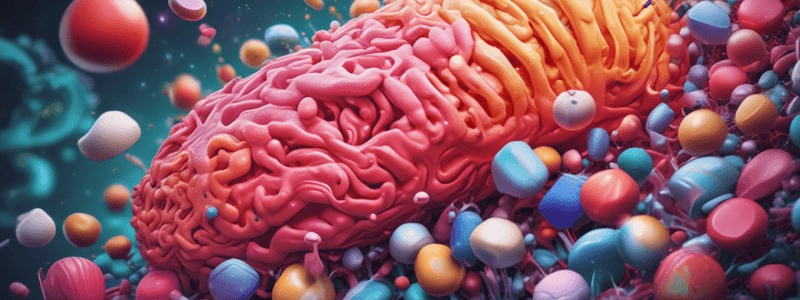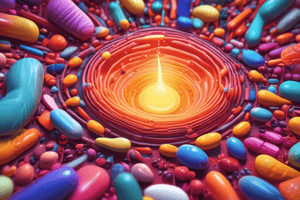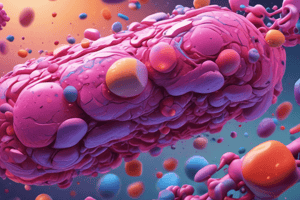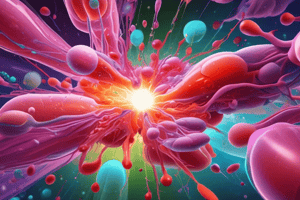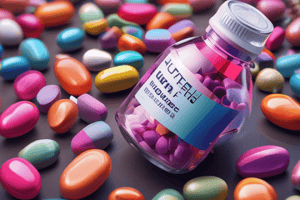Podcast
Questions and Answers
What is the mechanism of action of aliskirin?
What is the mechanism of action of aliskirin?
Inhibits the conversion of angiotensinogen into angiotensin I, suppressing the entire RAAS.
What are the therapeutic uses of captopril?
What are the therapeutic uses of captopril?
Captopril is used for high blood pressure, heart failure, and nephropathy.
What adverse effects are associated with angioedema?
What adverse effects are associated with angioedema?
Angioedema can be fatal and is linked to increased capillary permeability.
Which category of drugs can cause rebound hypertension if stopped abruptly?
Which category of drugs can cause rebound hypertension if stopped abruptly?
What are the therapeutic uses of eplerenone?
What are the therapeutic uses of eplerenone?
What is a notable drug interaction to be cautious about with ACE inhibitors?
What is a notable drug interaction to be cautious about with ACE inhibitors?
Which drug is specifically used for high blood pressure, stroke prevention, and diabetic nephropathy?
Which drug is specifically used for high blood pressure, stroke prevention, and diabetic nephropathy?
What is a unique adverse effect associated with quinidine?
What is a unique adverse effect associated with quinidine?
What is the first line use of quinidine in the African American population?
What is the first line use of quinidine in the African American population?
How do organic nitrates like nitroglycerin work in the body?
How do organic nitrates like nitroglycerin work in the body?
What is a common side effect of organic nitrates like nitroglycerin?
What is a common side effect of organic nitrates like nitroglycerin?
Why should hypotensive drugs, especially beta blockers, be used with caution alongside nitroglycerin?
Why should hypotensive drugs, especially beta blockers, be used with caution alongside nitroglycerin?
What is the primary mechanism of action of calcium channel blockers (CCBs)?
What is the primary mechanism of action of calcium channel blockers (CCBs)?
What are the main therapeutic uses of calcium channel blockers (CCBs)?
What are the main therapeutic uses of calcium channel blockers (CCBs)?
What are some common adverse effects associated with calcium channel blockers (CCBs)?
What are some common adverse effects associated with calcium channel blockers (CCBs)?
How do the different classes of calcium channel blockers (CCBs) differ in their effects on the cardiovascular system?
How do the different classes of calcium channel blockers (CCBs) differ in their effects on the cardiovascular system?
What is the role of digoxin, a cardiac glycoside, in the management of cardiovascular conditions?
What is the role of digoxin, a cardiac glycoside, in the management of cardiovascular conditions?
How do organic nitrates, a class of vasodilators, work to treat cardiovascular conditions?
How do organic nitrates, a class of vasodilators, work to treat cardiovascular conditions?
What is the mechanism of action and therapeutic use of hydralazine, another type of vasodilator?
What is the mechanism of action and therapeutic use of hydralazine, another type of vasodilator?
What is the mechanism of action of ACE inhibitors and ARBs?
What is the mechanism of action of ACE inhibitors and ARBs?
What are the therapeutic uses of ACE inhibitors and ARBs?
What are the therapeutic uses of ACE inhibitors and ARBs?
What is a key adverse effect of ACE inhibitors that is less common with ARBs?
What is a key adverse effect of ACE inhibitors that is less common with ARBs?
Why are ACE inhibitors and ARBs preferred over beta blockers in asthma patients with hypertension?
Why are ACE inhibitors and ARBs preferred over beta blockers in asthma patients with hypertension?
What is a common drug interaction to be aware of when initiating ACE inhibitor therapy?
What is a common drug interaction to be aware of when initiating ACE inhibitor therapy?
Give an example of an ACE inhibitor drug name, and explain the naming convention.
Give an example of an ACE inhibitor drug name, and explain the naming convention.
Give an example of an ARB drug name, and explain the naming convention.
Give an example of an ARB drug name, and explain the naming convention.
How do the administration and dosing of ACE inhibitors and ARBs compare?
How do the administration and dosing of ACE inhibitors and ARBs compare?
Besides cough, what are some other common adverse effects of ACE inhibitors and ARBs?
Besides cough, what are some other common adverse effects of ACE inhibitors and ARBs?
Flashcards are hidden until you start studying
Study Notes
Renin-Angiotensin-Aldosterone System (RAAS)
- Angiotensin Converting Enzyme Inhibitors (ACEIs) and Angiotensin Receptor Blockers (ARBs) are used to treat hypertension, heart failure, and myocardial infarction.
- ACEIs reduce levels of angiotensin II, dilating blood vessels, and increase levels of bradykinins, causing cough and angioedema.
- ARBs block access to receptors in blood vessels, having similar effects as ACEIs, but without inhibiting Kinase II, resulting in less cough and angioedema.
ACE Inhibitors
- Examples include captopril, enalapril, and lisinopril.
- Used to treat high blood pressure, heart failure, and nephropathy.
- Can cause hyperkalemia, angioedema, and cough.
Angiotensin Receptor Blockers (ARBs)
- Examples include losartan, olmesartan, and valsartan.
- Used to treat high blood pressure, stroke prevention, and diabetic nephropathy.
- Less likely to cause cough, angioedema, and hyperkalemia.
Direct Renin Inhibitors
- Aliskiren is the only medication in this class.
- Inhibits the conversion of angiotensinogen into angiotensin I, suppressing the entire RAAS.
- Used to treat hypertension.
- Less likely to cause cough, angioedema, and hyperkalemia.
Aldosterone Antagonists
- Eplerenone is a selective aldosterone receptor blocker.
- Used to treat hypertension and heart failure.
- Fewer side effects than spironolactone.
Calcium Channel Blockers (CCBs)
- Mechanism of action: prevents calcium from entering cells, decreasing heart rate and myocardial contraction.
- Used to treat hypertension, angina pectoris, and dysrhythmias.
- Examples include amlodipine, nifedipine, verapamil, and diltiazem.
Other Vasodilators
- Hydralazine, nitroprusside, and minoxidil are used to treat hypertension and heart failure.
- Nitroprusside is used in emergency situations for hypertensive emergency.
- Minoxidil can cause serious side effects.
Cardiac Glycosides
- Also known as digitalis drugs.
- Mechanism of action: increases force of contraction, slows conduction, and increases refractory period.
- Used to treat hypertension, heart failure, and dysrhythmias.
- Examples include digoxin.
- Adverse effects include headaches, drowsiness, flushing, fatigue, and dizziness.
Anti-Dysrhythmics
- Several categories, including sodium channel blockers, beta-adrenergic blockers, potassium channel blockers, calcium channel blockers, and others.
- Used to treat dysrhythmias and prevent sudden cardiac death.
- Examples include quinidine, which has many drug interactions and can cause CNS and GI adverse effects.
Organic Nitrates
- Used to treat angina pectoris, decreasing oxygen demand by promoting dilation of veins.
- Examples include nitroglycerin, which has various routes and durations of administration.
- Adverse effects include headache, orthostatic hypotension, and reflex tachycardia.
Studying That Suits You
Use AI to generate personalized quizzes and flashcards to suit your learning preferences.
